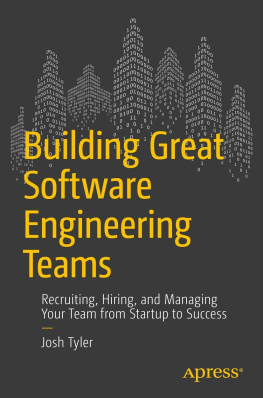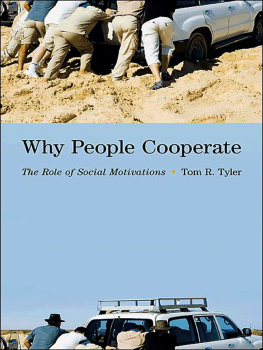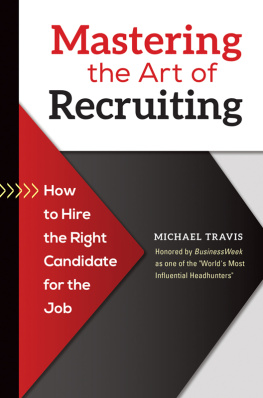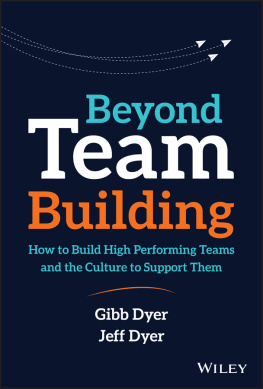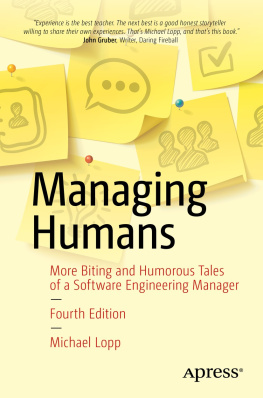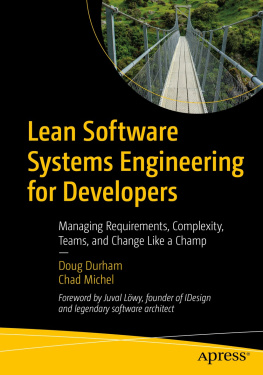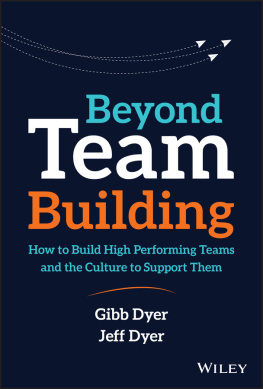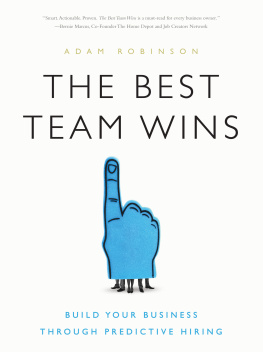Startups fall into one of two groups: Growing and Dying.
Theres no in-between.
To clarify, in this book the term startup refers to a product-oriented company in the process of finding and scaling a high-growth business model. There are many kinds of small, young, and growing companies, but this book focuses on the experience of technology startups, most likely backed by venture capital or seed funding, of the sort you find in Silicon Valley and other major tech hubs.
If your company is growing, odds are good that youre looking to hire software engineers. You know that hiring engineers is difficult, either from personal experience or because everyone tells you so.
The purpose of this book is to show you how to make tangible progress on this intimidating problem. Though written from the perspective of a startup, the material here should be useful for those building technical teams in a variety of environments.
Why Is It So Hard to Build an Engineering Team?
Building an engineering team is a multidimensional challenge. The high-risk, high-reward nature of technology startups means that some will be huge successes, but only very few. The economics of venture capital place a huge importance on getting the absolute best talent, especially when it comes to engineers, who are typically the primary builders of a startups product. Industry conventional wisdom compounds this problem by promoting the premise that some programmers are 10 times (or even 100 times) more valuable than the average coder. Its also difficult to know how to identify top engineers without extensive hands-on experience, which is of course impossible to get in typical interviews.
Once youve finally found an engineer you think is good, getting that person to join your team is another daunting challenge. Youre probably competing against other attractive companies and facing unanswerable questions, such as these: How much should we offer? Should we extend our offer deadline? What are the candidates true decision-making criteria? And so on.
Finally, as you start to assemble a team of promising engineers, you confront one of the most neglected and misunderstood functions in tech startup companies: management. How will you help the people on your team be more productive, happy, and grow their own capabilities along with the company?
This book is written for startup founders, engineering managers, and other technical leaders trying to build a team in a high-growth, competitive environment. Before we get into the details of potential techniques, considerations, and solutions for the challenges Ive described, lets consider them each in a bit more detail.
Tech Talent Is in Short Supply
The rise of computing technology has created an ever-increasing demand for people who can write the software to control nearly all aspects of our economy and industry. As noted entrepreneur and investor Marc Andreesseen puts it, Software is eating the world.
Software isnt written for only desktop computers. Its in everything, from toasters, to laptops, to watches, to mainframe computers, to the systems that control all the life-sustaining infrastructure of the modern world. Tesla Motors isnt a car company; its a software company that makes cars. Implementing the Affordable Care Act was mostly a software problem (and one that had a few bugs). Google has a team of over 50,000 people to provide search results for one empty text box.
Unfortunately, the worlds educational system hasnt produced software engineers to meet the rate of job creation. And its likely to get worse: Employment of software developers is projected to grow 22 percent from 2012 to 2022, much faster than the average for all occupations. The main reason for the rapid growth is a large increase in the demand for computer software.
In short, the world needs more programmers.
Tech Culture Exaggerates the Problem
While the engineering shortage is real, it also gets exaggerated in misleading and unproductive ways. Very much a part of tech culture, the difficulty of finding developers is one of the most frequently discussed topics in Silicon Valleyin the media, in coffee shops, and within companies themselves.
While its easy to simply complain, as many do, that there arent any engineers available to hire, its also lazy and not totally accurate. It would be more accurate to say that everyone is trying to hire the same small subset of engineers, and there definitely arent enough of them to go around.
Why are most companies looking to hire the same people? It starts with the notion of the 10x programmer a coder or software engineer who is 10 (or more) times more productive than average. Whether or not you believe this disparity exists, enough people do that competition for possible candidates is fierce.
The problem is that you cant truly and reliably identify 10x talent in your interviews. If you could, engineering salaries would vary by up to 10 times as well. Even at the height of a boom in Silicon Valley, engineers arent being offered millions per year in salary.
This hasnt stopped some people from trying, however. The ideal candidate typically looks something like this:
Bachelors degree in computer science (CS) from Stanford or MIT (advanced degrees are OK but dont really add to perceived value)
Worked for a little whilebut not too longat a phenomenally successful company (Google or Facebook, for example)
Documented experience with the latest and greatest software development languages, tools, techniques, and frameworks (the specifics depend on the company and market)
The venture capital (VC) industry, which guides so much of what happens in Silicon Valley startups, has a unique approach to maximizing return on investment. VC firms are typically trying to land a small number (even just one) of homerunsdeals that make them 100 times, or even 1,000 times the amount they originally put in. For example, in 1999 two firms, Sequoia Capital and Kleiner Perkins Caulfield & Byers, each invested $$12.5 million for 10 percent of a fast-growing search startup with a funny name. At the time of this writing, Googles market capitalization is near $$400 billion, meaning that, even considering dilution and other factors, each firms stake would be worth well over 1,000 times the original amount.
This high-stakes, winner-take-all (or close to it) environment further fuels the notion that you must find the absolute best, the elite technical minds of the world, in order to succeed. If youre hoping to see an investment grow by at least 10 times, its logically consistent to look for 10x staff, including programmers. And since the early-stage startups are mostly programmers, thats the role for which this problem is most acute.
The emphasis on finding premier engineers has permeated the culture and vocabulary of Silicon Valley. Its not enough to hire a good coderthey need to be rock stars or ninjas. Not only is this approach arbitrary and elitist, its not even accurate.
A great engineer has little in common with a true rock star. Music and entertainment icons must relish the spotlight and play up a larger-than-life persona. Its hard to imagine a successful engineering career with similar behavior. Nor would you want an engineer with the espionage, sabotage, and assassination skills of a ninja.
Nonetheless, startups everywhere advertise their need to hire a rock-star coder or front-end ninja, further perpetuating the damaging myth that only a select few people are qualified to help create great products.

